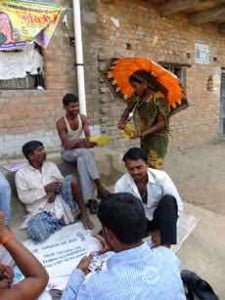In Karwi’s Ward 10, there are 31 candidates for the ward member seat that is reserved for a woman. Of these, BJP MP Bhairon Prasad’s daughter-in-law, Ekta Mishra, is one, and Dalit woman (from the Chamar caste) Javitri Devi is another. What are the chances and strategies of poor and marginalised candidates to swing votes? Will those with power and money prevail? Khabar Lahariya spent a day on the trail with candidate Javitri Devi.
Javitri is 25 years old, from Kasahai village in Karvi block of Chitrakoot district. She was married after studying till Class VIII, but she said “I will only marry into a house which will let me study further.” Her parents fulfilled this last responsibility, and her in-laws educated her until Class XII, although without allowing her to go to school. Even her exams papers traveled home. We asked – when she could not even go outside her home to study, how did she think of fighting the election and why?
“When I found out that there were seats for women candidates, I said jokingly during dinner – put me up as a candidate for this election. And they did. I always wanted to stand for an election. I want to serve society, and reduce violence against women.” While referring to her candidacy, Javitri uses the colloquial Hindi for how women candidates are nominated for elections: election mein khada karwana. This refers to the fact that women candidates are usually propped up by their husbands or male members of their family – often put up as a puppet woman candidate, whose political decisions will actually be controlled by the men in the family. This is true for this year’s elections in UP as well.
The Khabar Lahariya team asks her about this dynamic. Earlier, her campaign posters had only Javitri’s photo on them; however, later, her husband also began to appear on some posters. “He has been involved in politics here for the last two years, so people know him well. When the government was distributing cycles, he gave cycles to lots of people. So he is well known here. I have never even left the house, so who would know of me?”
Javitri’s loquacious husband Rajjan Kumar Bharti is affiliated with Dalit politics, on which he has a strong opinion. “My uncle Shrikrishan Azaad ji readied the ground for BSP in Chitrakoot, but upper-caste and other powerful people made sure he didn’t win the election. Now you can’t even get a BSP seat without [paying] 50 lakhs or a crore. So what will become of us poor people? When we are no longer oppressed [by these groups], only then will we be able to progress.”
In this election, Javitri Devi has been supported by Bahujan Mukti Morcha’s leader, Bishambar Nath Kabir. He and Rajjan were campaigning for Javitri Devi, until the day she said, “If you have put me up as a candidate in this election then I should also be present at meetings and campaigns.”
We chatted with Javitri Devi for quite a while, waiting for Kabir and his Bolero to begin the day’s canvassing. “If we had rented a car then we would be able to go out on time, but what to do, we have to go by Sahib Ji’s time. We’ll give him lunch and then head out.”
We asked Javitri her experience of the election process up till now. “I only went for the nomination – it was all men…I didn’t talk to anyone. When the election symbols were being given out I called my husband and asked, can we go and get one? He said he and Sahibji would get it, I don’t need to come for that. If a man decrees that it is so, what can a woman say? But when I go out, meet people, only then will I know [what it is like]. For example, I had told Sahib Ji that if you go campaigning after 12 o’clock, you won’t find anyone – they’re all harvesting crops in the fields. The village will be empty. We need to go out earlier, so that we can have a good campaign. I also said that a loudspeaker would be helpful, but he said there’s no need.”
Her sister-in-law chimes in – “Going outside the house broadens the mind!”
While waiting for Sahib Ji, we asked Javitri about the competition in Ward 10. “I’ve heard that for [a competitor’s] campaign, 25-30 cars have been employed, and the MP will bribe voters. All the big parties do this. Even in the Lok Sabha elections, this happened, and [after the elections] all these big politicians are nowhere to be seen.” Nepotism and tried and tested strategies to keep political power within the family is an unabashed part of the election game. Along with Bhairon Prasad Mishra, many other ministers and members of parliament are putting up their relatives as candidates.
After four hours, Sahib Ji arrives, and he is fed pooris, after which we set out campaigning. Holding colourful umbrellas (her election symbol), Javitri Devi, together with all the women in the family, starts shouting slogans and campaigning in a Dalit neighbourhood. Javitri introduced herself confidently: she is a new contender and a woman campaigning for herself. “I plan to study further, if we have the money. But first, let’s see what the [result] of the election is – the poor are quite impressed by the Umbrella. Hopefully, they will support us.”
Click here to read the original Hindi version of this story in Khabar Lahariya’s Panchayati Raj Chunao special issue.
